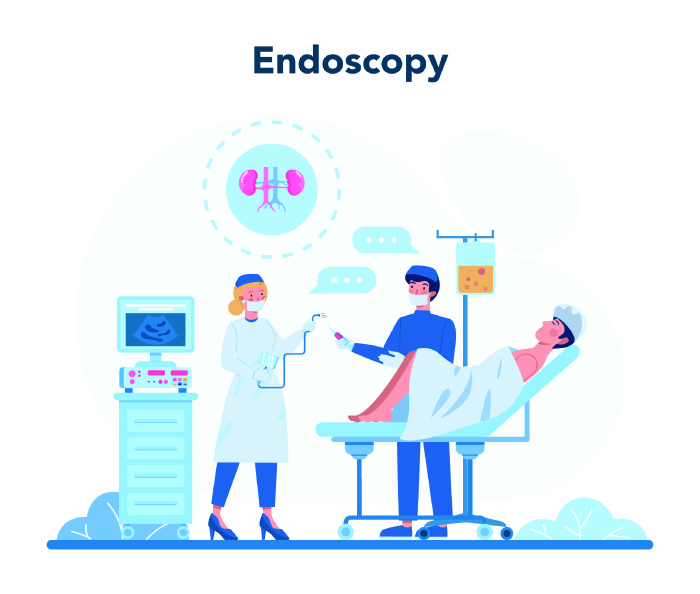Urological endoscopy Treatment & Diagnostics in Tardeo, Mumbai
Urological endoscopy
Urinary tract problems such as urinary tract infections, bladder stones, etc, can be very painful and uncomfortable. A urological endoscopy is performed to obtain images of your urinary system. This procedure can help in determining a good treatment plan for your condition. For more information, google "urologist near me".

What is a urological endoscopy?
A urological endoscopy is a minimally invasive procedure in which a tube fitted with a video camera is inserted into your body. This camera takes images of your urinary system and helps diagnose the condition affecting you. This procedure is the most effective form of diagnosis for urinary tract conditions.
What are the types of urological endoscopy?
There are two types of urological endoscopy, namely cystoscopy and ureteroscopy.
- Cystoscopy: A cystoscopy is a procedure in which a cystoscope is inserted into your body through your urethra to examine the lining of your urinary bladder. Usually, a local anesthesia gel will be applied to numb your urethra before the procedure begins but it can also be performed under general anesthesia or sedation. This type of endoscopy is used to locate problems in your urethra and bladder.
- Ureteroscopy: A ureteroscopy is the type of endoscopy in which a ureteroscope (a thin flexible telescope) is inserted into your bladder and ureter to detect signs of kidney stones or other conditions. Ureteroscopy is used to locate problems in your ureter and kidneys.
Why is a urological endoscopy done?
It is done to diagnose and treat conditions that affect your bladder, ureter, urethra, and kidneys. Some of them are:
- Enlarged prostate
- Bladder tumors
- Bladder cancer
- Bladder and kidney inflammation
- Bladder and kidney stones
- Kidney diseases
When do you need to see a doctor?
If you experience pain, inflammation or any other symptoms related to a urological problem, visit a urology doctor in Tardeo.
You can request an appointment at Apollo Spectra Hospitals, Tardeo, Mumbai.
Call 1860 500 2244 to book an appointment.
What are the complications?
Some serious complications that may occur due to this endoscopy are:
- An inability to urinate after the procedure
- Abdominal pain
- Nausea
- A high fever (higher than 101.4 F)
- Chills
- Bright red or cola-colored urine (hematuria)
- Blood clots in your urine
How do you prepare for a urological endoscopy?
- Antibiotics: Your doctor might ask you to take antibiotics before and after the procedure. This step is taken to help you fight off infections that might develop due to the procedure.
- Have a full bladder: Before the endoscopy, your doctor might want to analyze your urine. Wait to empty your bladder right until the procedure begins, just in case your doctor orders a urine test.
- Prepare for anesthesia: Sometimes, you might receive sedatives or general anesthesia before the procedure. In such cases, prepare beforehand for assistance.
How is a urological endoscopy performed?
- Emptying your bladder: The first step is to empty your bladder after which you will lie down on a table.
- Sedation: Depending on whether or not you need sedation or local anesthesia, you will be administered the same. Sedation will keep you unaware of the procedure while local anesthesia will keep you awake and aware.
- Insertion of the endoscope: Depending on whether you're undergoing a cystoscopy or ureteroscopy, your doctor will insert a cystoscope or a ureteroscope through your urethra. Your urinary tract will then be examined and your condition will be diagnosed.
Conclusion
The results of your endoscopy are usually discussed right after the procedure unless the procedure involves a biopsy. An endoscopy can be used to diagnose and treat certain conditions in your urinary system. To prepare for the appointment, speak to your endoscopy doctor in Mumbai.
Usually, an endoscopy is not painful even when you are not sedated. However, it can cause a lot of discomfort. If you experience pain, your doctor will apply a numbing gel on the area where you are experiencing pain.
All endoscopy procedures involve some sort of sedation. Usually, local anesthesia or a numbing gel is used at the site of insertion. You will be awake during the procedure as total sedation is usually not required.
A cystoscopy typically takes about 15 to 30 minutes when performed at a hospital under anesthesia. If the procedure is a simple outpatient cystoscopy, it can be performed in 5 to 15 minutes.
A cystoscopy can pose a few risks to your body. This includes a perforation or tear in your urinary tract. You can use a Foley catheter to urinate until you recover from the perforation or tear.
Our Top Specialities
NOTICE BOARD
CONTACT US
CONTACT US
 Book Appointment
Book Appointment


.svg)
.svg)
.svg)
.svg)








